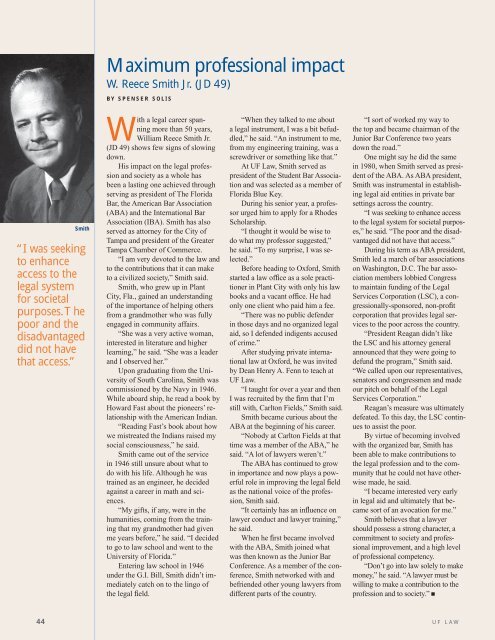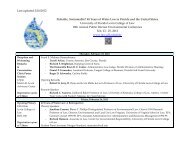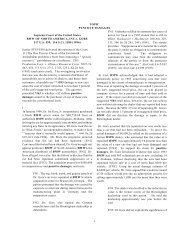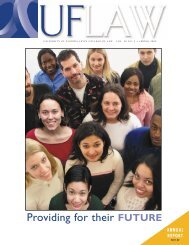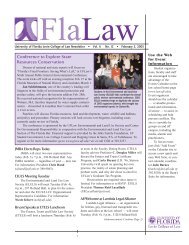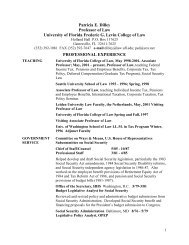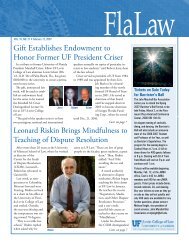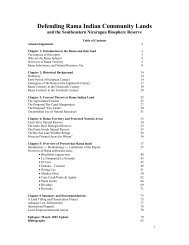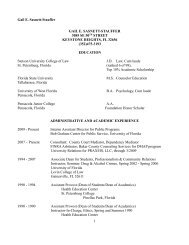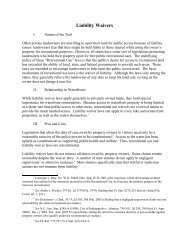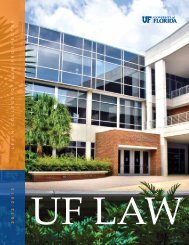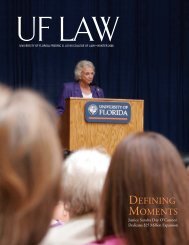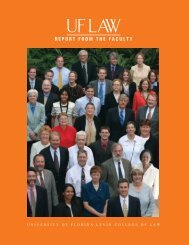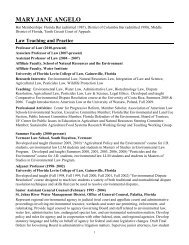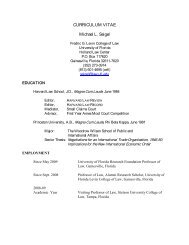Download Magazine - Levin College of Law - University of Florida
Download Magazine - Levin College of Law - University of Florida
Download Magazine - Levin College of Law - University of Florida
Create successful ePaper yourself
Turn your PDF publications into a flip-book with our unique Google optimized e-Paper software.
Maximum pr<strong>of</strong>essional impactW. Reece Smith Jr. (JD 49)BY SPENSER SOLISSmith“I was seekingto enhanceaccess to thelegal systemfor societalpurposes. Thepoor and thedisadvantageddid not havethat access.”With a legal career spanningmore than 50 years,William Reece Smith Jr.(JD 49) shows few signs <strong>of</strong> slowingdown.His impact on the legal pr<strong>of</strong>essionand society as a whole hasbeen a lasting one achieved throughserving as president <strong>of</strong> The <strong>Florida</strong>Bar, the American Bar Association(ABA) and the International BarAssociation (IBA). Smith has alsoserved as attorney for the City <strong>of</strong>Tampa and president <strong>of</strong> the GreaterTampa Chamber <strong>of</strong> Commerce.“I am very devoted to the law andto the contributions that it can maketo a civilized society,” Smith said.Smith, who grew up in PlantCity, Fla., gained an understanding<strong>of</strong> the importance <strong>of</strong> helping othersfrom a grandmother who was fullyengaged in community affairs.“She was a very active woman,interested in literature and higherlearning,” he said. “She was a leaderand I observed her.”Upon graduating from the <strong>University</strong><strong>of</strong> South Carolina, Smith wascommissioned by the Navy in 1946.While aboard ship, he read a book byHoward Fast about the pioneers’ relationshipwith the American Indian.“Reading Fast’s book about howwe mistreated the Indians raised mysocial consciousness,” he said.Smith came out <strong>of</strong> the servicein 1946 still unsure about what todo with his life. Although he wastrained as an engineer, he decidedagainst a career in math and sciences.“My gifts, if any, were in thehumanities, coming from the trainingthat my grandmother had givenme years before,” he said. “I decidedto go to law school and went to the<strong>University</strong> <strong>of</strong> <strong>Florida</strong>.”Entering law school in 1946under the G.I. Bill, Smith didn’t immediatelycatch on to the lingo <strong>of</strong>the legal field.“When they talked to me abouta legal instrument, I was a bit befuddled,”he said. “An instrument to me,from my engineering training, was ascrewdriver or something like that.”At UF <strong>Law</strong>, Smith served aspresident <strong>of</strong> the Student Bar Associationand was selected as a member <strong>of</strong><strong>Florida</strong> Blue Key.During his senior year, a pr<strong>of</strong>essorurged him to apply for a RhodesScholarship.“I thought it would be wise todo what my pr<strong>of</strong>essor suggested,”he said. “To my surprise, I was selected.”Before heading to Oxford, Smithstarted a law <strong>of</strong>fice as a sole practitionerin Plant City with only his lawbooks and a vacant <strong>of</strong>fice. He hadonly one client who paid him a fee.“There was no public defenderin those days and no organized legalaid, so I defended indigents accused<strong>of</strong> crime.”After studying private internationallaw at Oxford, he was invitedby Dean Henry A. Fenn to teach atUF <strong>Law</strong>.“I taught for over a year and thenI was recruited by the firm that I’mstill with, Carlton Fields,” Smith said.Smith became curious about theABA at the beginning <strong>of</strong> his career.“Nobody at Carlton Fields at thattime was a member <strong>of</strong> the ABA,” hesaid. “A lot <strong>of</strong> lawyers weren’t.”The ABA has continued to growin importance and now plays a powerfulrole in improving the legal fieldas the national voice <strong>of</strong> the pr<strong>of</strong>ession,Smith said.“It certainly has an influence onlawyer conduct and lawyer training,”he said.When he first became involvedwith the ABA, Smith joined whatwas then known as the Junior BarConference. As a member <strong>of</strong> the conference,Smith networked with andbefriended other young lawyers fromdifferent parts <strong>of</strong> the country.“I sort <strong>of</strong> worked my way tothe top and became chairman <strong>of</strong> theJunior Bar Conference two yearsdown the road.”One might say he did the samein 1980, when Smith served as president<strong>of</strong> the ABA. As ABA president,Smith was instrumental in establishinglegal aid entities in private barsettings across the country.“I was seeking to enhance accessto the legal system for societal purposes,”he said. “The poor and the disadvantageddid not have that access.”During his term as ABA president,Smith led a march <strong>of</strong> bar associationson Washington, D.C. The bar associationmembers lobbied Congressto maintain funding <strong>of</strong> the LegalServices Corporation (LSC), a congressionally-sponsored,non-pr<strong>of</strong>itcorporation that provides legal servicesto the poor across the country.“President Reagan didn’t likethe LSC and his attorney generalannounced that they were going todefund the program,” Smith said.“We called upon our representatives,senators and congressmen and madeour pitch on behalf <strong>of</strong> the LegalServices Corporation.”Reagan’s measure was ultimatelydefeated. To this day, the LSC continuesto assist the poor.By virtue <strong>of</strong> becoming involvedwith the organized bar, Smith hasbeen able to make contributions tothe legal pr<strong>of</strong>ession and to the communitythat he could not have otherwisemade, he said.“I became interested very earlyin legal aid and ultimately that becamesort <strong>of</strong> an avocation for me.”Smith believes that a lawyershould possess a strong character, acommitment to society and pr<strong>of</strong>essionalimprovement, and a high level<strong>of</strong> pr<strong>of</strong>essional competency.“Don’t go into law solely to makemoney,” he said. “A lawyer must bewilling to make a contribution to thepr<strong>of</strong>ession and to society.” ■44 UF LAW


